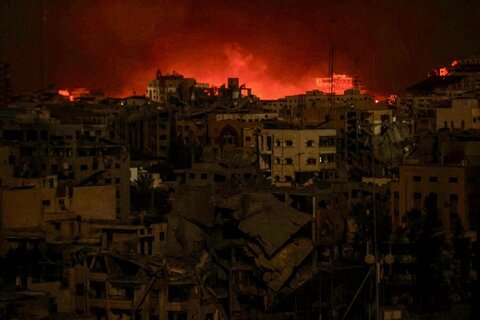As bombs and hunger haunt Gaza, WFP and partners push to ramp up support

Samer AbdelJaber can often be seen pacing up and down the halls of his base in Jerusalem. Grasping his phone, and with a steady voice, the World Food Programme's (WFP) Country Director for Palestine negotiates humanitarian access into Gaza, where six weeks of war have killed more than 11,000 people and triggered mass displacement, widespread hunger and the risk of starvation.
The conflict has unleashed a humanitarian catastrophe beyond reckoning. Relentless bombardment and a severe lack of fuel and gas have suffocated the enclave and hindered all humanitarian operations, with only 10 percent of WFP's available food assistance trickling through since the start of the crisis.
Diary from Gaza: 'There's no time to mourn anyone or anything'

“We must reach everyone despite the odds. We are doing everything we can, engaging with all stakeholders, to get food into Gaza and carry out life-saving initiatives that can help people cope,” says AbdelJaber.
More than two thirds of Gaza’s 2.3 million people have been forced out of their homes. Many now linger in overcrowded shelters, makeshift tents and open areas without enough food, clean water, proper sewage or sanitation. Entire districts have been razed to the ground along with markets, shops, bakeries and public services. Those lucky to escape death by bombardment risk starving to death or dying of disease.
Starvation and disease
“We scavenge the streets for plastic to make a fire to cook whatever we find for our children. We have no flour and the children are sick with diarrhoea. No one is standing by us. What have we done to deserve this?” Al-Masry told WFP staff on the ground. Her husband died following an airstrike on their home in Bayt Layhya, northern Gaza, leaving her to fend for her children alone.
“What I desperately need is a bag of flour so my children can taste bread again,” Khitan told WFP staff in Gaza’s Khan Yunis, where she found shelter. Meanwhile, WFP trucks loaded with over 1,000 metric tons of food line up at the Rafah border, waiting to reach Khitan and others in Gaza.
Fuel, access and small victories
Following WFP’s warning of the immediate risk of starvation facing Gazans, an agreement came into effect on Friday 17 November to allow in some fuel to facilitate the delivery of aid. Eight of WFP’s trucks inside Gaza finally managed to transport two-weeks’ worth of emergency food supplies for nearly 23,000 people.
Increasing the volume and flow of assistance is the only way to contain the humanitarian catastrophe unfolding. A full-scale humanitarian response to save lives and ease pressure on battered communities requires at least 100 trucks of food supplies a day, multiple entry points from all sides and a cessation of hostilities. WFP can reach more than 1 million people by December, working with multiple humanitarian actors and partners.

Besides the food deliveries at distribution sites, WFP can help support commercial activity in local markets by distributing in-kind food parcels to emptied shops until a time when commercial goods begin to flow in once more.
Staff on the ground in Gaza have assessed all existing bakeries to rehabilitate any that can be salvaged, while looking to introduce solar-powered cookers to help communities access bread. Right now, none of WFP’s contracted bakeries inside Gaza is functioning, while a WFP-contracted mill that was one of the largest in Gaza was hit and damaged.
To strengthen its monitoring of operations inside Gaza amid a power blackout, the WFP-led Emergency Telecommunications Cluster is identifying ways to import telecommunications equipment to monitor movements of assistance and transactions. “Monitoring is a shared responsibility,” said AbdelJaber, stressing the need to re-establish connectivity in Gaza.
For AbdelJaber, the news of assistance reaching war-ravaged Gazans, and the safe return of his staff to their base at the end of each day, counts among the small victories that fuel him and his team to save lives against all odds. “While the light at the end of the tunnel may be far from reach, we cannot afford to lose hope,” he said.




